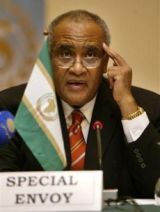AU mediator says Sudan negotiators progressing in peace talks
April 19, 2006 (UNITED NATIONS) — The warring factions in Sudan’s Darfur region have their best chance yet to reach a peace deal by an April 30 deadline, though none of the sides have offered major concessions so far, the top African Union mediator said Tuesday.

Minutes later, the United States introduced a draft resolution that would impose sanctions on four Sudanese accused of rights violations in Darfur. The travel ban and asset freeze would be the first against any participants in the Darfur conflict.
China and Russia blocked earlier efforts to impose sanctions on the four, warning that such measures could complicate the talks. By introducing a council resolution, the U.S. was essentially daring them to cast vetoes to block the resolution.
U.S. Ambassador John Bolton said he was undecided about whether to seek a vote on the resolution before the April 30 deadline for concluding the Abuja talks, set by the African Union and endorsed by the Security Council.
“I’d like to hear the argument. I mean, the individuals who are named are people who committed gross violations of human rights,” Bolton said. “I don’t see how going after people like that can or should affect the Abuja talks.”
Salim would not say if he thought sanctions were the right move now.
“Sanctions can help send the right message to the spoilers,” Salim told reporters. “But also sanctions can help to harden the position of some of those involved.”
His carefully worded speech offered a mixed assessment to the council on the state of negotiations. However, he appeared more upbeat than he has been in the past about prospects for peace in Darfur.
“We are in the final stretch of concluding the Darfur peace agreement. The mediation is ready, and we believe the time is right for the parties to move beyond arguments to decisions,” he said.
At the same time, he said the two sides had yet to make significant concessions or overcome deep suspicions of each other. Darfur’s rebel movements still harbor “a deep and unyielding distrust” about the Sudanese government’s intentions, he said.
The conflict has caused about 180,000 deaths _ most from disease and hunger — and displaced 2 million people in a vast, arid region of western Sudan. An April 2004 cease-fire has been all but ignored, and seven rounds of talks since then have yielded little result.
Decades of low-level clashes over land and water in Darfur blew up into large-scale fighting in early 2003, when ethnic African farming tribes rebelled and accused the Arab-dominated central government of neglect. The government allegedly urged militias from nomadic Arab tribes to attack villages — a charge it denies.
Salim offered few details about the African Union proposals that he would put forward, except to say they will cover the sensitive issues of power and wealth sharing and security arrangements.
He said security “lies at the heart of Darfur’s crisis,” indicating that would include disarming the government-backed militias while safeguarding migration corridors for the nomadic tribes.
The names of the four Sudanese threatened with sanctions have not been made public.
But diplomats identified them as Gaffar Mahammed Elhassan, former commander of the Sudanese air force’s western region; Sheikh Musa Hilal, chief of the Jalul tribe in North Darfur; Adam Yacub Shant, a commander in the rebel Sudan Liberation Army; and Gabril Abdul Kareem Badri, a rebel commander in the National Movement for Reform and Development.
